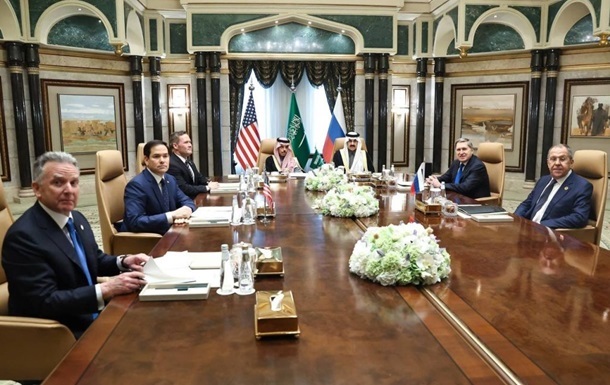“Dialogue was not easy”: Russian officials talk about negotiations with the United States
25 March 10:59
Dialogue at the talks between the Russian and US expert groups in Riyadh turned out to be difficult, but useful for both countries. This was stated by the Chairman of the Federation Council Committee on International Affairs, a member of the Russian delegation, Grigory Karasin, "Komersant Ukrainian" reports citing Russian media.
Highlights of the talks
According to Karasin, the agenda included various issues, including the safety of navigation in the Black Sea, a ceasefire and the protection of critical infrastructure.
According to him, everything was discussed, various problems, and the dialogue was intense and useful for both Russians and Americans. The senator noted that not all problems were resolved, not everything was agreed upon, but the very fact that the dialogue took place is very timely given the arrival of a new administration in the White House and new politicians.
Karasin noted that the talks between Russia and the United States will continue, and they will involve the United Nations (UN) and other countries.
This could create a new format for international dialog to resolve Russia’s war against Ukraine.
Results of the meeting
The talks between the representatives of Russia and the United States lasted 12 hours. According to Russian Senator Vladimir Dzhabarov, the discussion was serious and complicated, but the parties sought to understand each other.
According to him, the Russian delegation is already flying back to Moscow from Saudi Arabia and is expected to arrive in the evening, Moscow time.
On March 25, the delegations are expected to release a final statement outlining the main agreements.
Who participated in the talks?
The Russian side was represented by Senator Grigory Karasin and FSB Director’s Advisor Sergei Beseda.
The United States was represented at the meeting by Michael Anthon, Director of Policy Planning at the State Department, as well as assistants to Special Envoy for Ukraine Keith Kellogg and National Security Advisor Mike Waltz.
The talks were held between the main participants of the previous conversations, but at the level of technical teams. On Sunday, the Ukrainian side was represented by the military, diplomats, and representatives of the Ministry of Energy.
Main goals of the talks
According to preliminary data, the Black Sea Initiative will be the key topic of discussion. However, the Kremlin has admitted the possibility of discussing other aspects of the Ukrainian settlement.
According to Reuters, during Monday’s talks, the US delegation will seek to make progress on a ceasefire in the Black Sea and a broader cessation of violence in the war in Ukraine.
Bloomberg’s sources say the US administration is seeking a ceasefire between Russia and Ukraine before Easter, which is celebrated by both Orthodox and Catholics this year on April 20. However, the White House does not rule out that the deadline will have to be adjusted due to the many disagreements between the parties to the conflict.
According to the agency’s sources, a face-to-face meeting between the presidents of Russia and the United States is possible only after a comprehensive peace agreement is reached, and this is “unlikely before mid-April.”
This is not the first attempt by the American and Russian sides to find common ground on ending Russia’s war against Ukraine. Earlier, negotiations were held in Saudi Arabia to discuss a partial ceasefire. Later, U.S. President Donald Trump had a telephone conversation with Vladimir Putin, where these issues were also raised.
At the same time, no direct talks between the representatives of Russia and Ukraine are planned during this visit
Details of the talks between Ukraine and the United States
The day before, representatives of Washington met with a Ukrainian delegation, which included Deputy Chief of Staff of Volodymyr Zelenskyy’s office Pavlo Palisa and Inspector General of the Ministry of Defense of Ukraine Anatoliy Bargilevych.
Ukraine’s Defense Minister Rustem Umerov noted that the talks were “constructive and meaningful.” One of the topics discussed was the situation in the energy sector, which is of great importance for Ukraine’s security.
Follow us on Telegram: the main news in a nutshell
US-Russia talks
on February 18, Russian Foreign Minister Sergei Lavrov and Russian Assistant Prime Minister Yuri Ushakov met in Saudi Arabia with an American delegation, represented by Secretary of State Marco Rubio, National Security Advisor Mike Volz, and Special Envoy for the Middle East Steve Witkoff.
After the talks, the US State Department reported that the delegations agreed to “eliminate irritants” in bilateral relations and continue to work on preparing talks on Russia’s war against Ukraine.
The two sides also agreed to appoint high-level groups for further talks on Ukraine.
Jackie Heinrich, a Fox News correspondent at the White House, reported that the United States and Russia discussed a three-stage peace plan for Ukraine, which consists of the following stages
- A ceasefire.
- Holding elections in Ukraine.
- Conclusion of a peace agreement.
on February 27, negotiations between the Americans and Russians continued in Istanbul. According to the Russian side, they discussed the normalization of diplomatic relations. The Kremlin also allegedly demanded the return of 6 properties that had been seized from Russians in the United States in 2016-2018, and also proposed to resume air travel.
on March 13, Putin met in Moscow with Trump’s special envoy Steve Witkoff. The parties have not yet made any statements about the results of this meeting, except for the words of Trump’s national security adviser Mike Volz that there are grounds for cautious optimism.
Trump’s proposals to Putin
According to inaccurate information from former US Ambassador to Russia Michael McFaul(he used the word “allegedly”), Trump offered Putin (McFaul’s wording is retained)
- ukrainian territory;
- ukraine’s non-membership in NATO;
- no American soldiers in Ukraine;
- withdrawal of American soldiers from Europe, including from frontline countries;
- easing of sanctions.
According to McFaul, Putin has not offered anything yet.
Follow us on Telegram: the main news in brief









